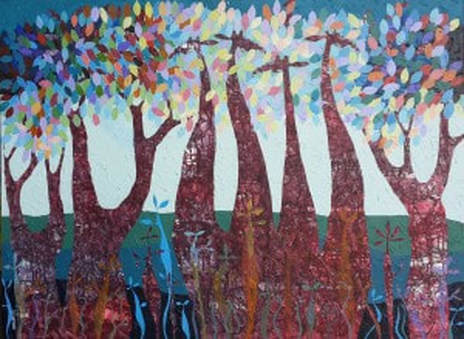 "Morning graziers," by Ronnie Ogwang. Photo by Shine Tani.
"Morning graziers," by Ronnie Ogwang. Photo by Shine Tani.
The reason given was that the play portrayed an ethnically diverse and politically cohesive Kenya, which contradicted the president’s argument at the time that Kenya was too ethnically divided for multi-partyism.
While President Moi was claiming to care for Kenyans who are too tribal, his government was ironically also suppressing any public display of Kenyans transcending their tribal identities. The government needed to encourage tribalism among Kenyans in order to give itself something to cure.
Cambridge Analytica's role in polarising Kenyans is part of the larger efforts of global and local elites to keep convincing Kenyans that we vote on nothing else but tribe. The elites manipulate culture in order to coerce us to believe that tribalism comes naturally to us Africans. And yet, the reality is something closer to what the government censor did in 1991.
The role of politicians in keeping ethnic temperatures high has been repeatedly stated. But there are two other pillars of keeping Kenyans convinced that they are naturally and inevitably tribalist: the use of culture andof research by envoys, journalists, researchers, and now, by Cambridge Analytica.
For instance, while Kenyans called for electoral justice, the US ambassador kept framing Kenya’s problem as “long-standing issues” that should be addressed through reconciliation between NASA and Jubilee. The ambassador was savvy enough to know that using the word “tribal” would evoke memories of colonial anthropology. But even “long-standing” is just as insidious, because it appeals to the colonial narrative of Africans as stuck in the past.
Similarly, articles in the local and international media often used tribal data to predict a Jubilee win. The research they quoted almost always used tribe as the major factor in elections, yet there are other factors which influence the way Kenyans vote, such as income, gender, urban migration, economic inequality or voter frustration with politicians.
If a basic rule of good research is that it cannot always use the same variable, it means that the researchers are perpetuating tribalism through faulty research.
Yet the variables exist. For instance, our media rarely mention economic inequality as a factor influencing election outcomes, and yet one article inJacobin found a strong correlation between economic inequality and votes for Raila Odinga.
In the New York Review of Books, Helen Epstein queried the sampling methods of predictions of election results, pointing out that some researchers worked backwards from a known result to a sample, rather than the other way round. Some researchers went to Luo regions and predictably projected a high Raila vote, and to Kikuyu populations and predicted a high Uhuru vote, but did not go, for example, to Kakamega, Bungoma, Busia, Kisii Nyanza, Garissa and other regions where Jubilee claimed to have won a majority.
Other times, electoral predictions remain unquestioned because claims are made from people with perceived academic clout. For instance, Mutahi Ngunyi gave prestige to the concept of “tyranny of numbers.” Most media did not question the validity of his concept, even when a poorly-circulated video done by Africog showed that the premises of Ngunyi’s argument were rather weak.
If Kenyans were naturally tribalistic, the politicians, intellectuals and envoys would not need to keep reminding us of it. And there is a political interest in insisting on our tribalism: it prevents us from asking questions about social justice or worse, from organizing ourselves along other lines such us age, profession, economic status and gender.
The nightmare of the foreign and local elite is of Kenyans organizing as the poor, youth, women or workers, because then, the numbers would surely have an impact. And politicians would not get automatic godfather status like they do as tribes. They would have to pass through institutions like associations and unions, where success is not guaranteed. For instance, politicians’ efforts to divide the doctors on tribal lines backfired and instead produced a hash tag #IAmaTribelessDoctor.
It does not matter how many Kenyans Cambridge Analytica influenced. Even one Kenyan is one Kenyan too many. What matters is that it appealed to Kenyans’ worst fears, essentially hoping to whip up hysteria, just so that the president could win the vote. Our dignity was cheaper than Muigai’s desire to win. Six million dollars cheaper.
But the worst part of the tribal propaganda is that it is based on convincing Kenyans to believe so little of themselves. To resist the efforts of Cambridge Analytica and similar social saboteurs in the media and the academy, we must believe in our capacity to vote on a diversity of issues. For as Daisy Amdany put it, “We are so much better than what the elites make us out to be. It's time to believe it, receive it, be it and live it!”
 RSS Feed
RSS Feed
